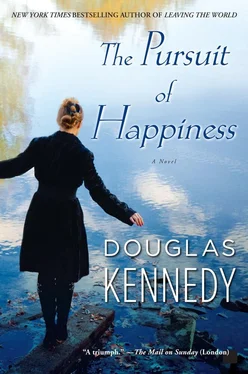'Grateful? Why?'
'Because I'm giving them the extra five thousand dollars I'm making this year from NBC for agreeing to vanish from the Wallace campaign'.
I laughed loudly. 'That's brilliant', I said. 'What a classy sting'.
He put his finger to his lips. 'It's obviously all Top Secret - because if NBC learned what I was doing with their hush money, the ax would fall on my head. There is a problem, though - I won't have the five grand until I start getting paid...'
'I'll write you a check', I said.
'I promise it will be paid back in full by February first'.
'Whenever. I'm just so damn impressed, Mr Machiavelli. Do you always never let the right hand know what the left hand is doing?'
'Hey - it's the American Way'.
Wallace, as predicted, was trounced at the polls. Like the rest of the nation, Truman went to bed on the night of the election, fully expecting to wake up to Thomas Dewey's victory. But the math didn't work out that way - and Harry stayed put at the White House. On the morning of the election, I got cold feet. Fearing that a vote for Wallace was, in actuality, a vote for Dewey - I switched allegiance and voted for the President. When I later admitted this to Eric, he just shrugged and said, 'I guess somebody has to be sensible in this family'.
Two months later, The Big Broadway Review with Marty Manning premiered on NBC. It was an immediate, huge hit. Shortly thereafter, my banker rang me one morning to say that a check for five thousand dollars had just been lodged to my account. Eric was always a man of his word.
And now, finally, he was also a huge success. The Big Broadway Review eventually turned into The Marty Manning Show - and became the talk of the town. Everyone adored it. I even went out and bought a television set - because, understandably, I had to see what my brother was cooking up each week. Marty Manning and his cohorts became overnight stars. But Eric and his writing team were also feted. The New York Times ran a lengthy profile in its Sunday Arts and Leisure section on a day in the life of the Marty Manning writers - in which Eric featured prominently as the witty ringleader of this gang of paid gag men. Even Winchell mentioned him in his column:
Heard a good yuck the other day at the Stork Club from Marty Manning scribe, Eric Smythe: 'Where there's a will, there's always a relative!' Smythe - Marty Manning's major-domo for one-liners - also has a talented sis: Sara, whose ha-ha column in Saturday Night/Sunday Morning keeps the ladies laughing every week. Talented yucksters, them Smythes...
'Did you really tell Winchell that terrible joke?' I asked Eric after the column appeared.
'I was drunk at the time'.
'Well, he obviously thought it was funny'.
'Don't you know that rabid Republicans never have a sense of humor'.
'I love being referred to as a "yuckster"'.
'What can I say, S? Fame at last'.
Not just fame - but also, for Eric, celebrity. Success transformed him. He reveled in his newfound professional esteem and prosperity. Finally, he cast off his aura of self-loathing, his need to play the failed writer-in-the-garret. Within a month of the show's premiere, he exchanged his down-at-heel atelier on Sullivan Street for an elegant furnished apartment at the Hampshire House on Central Park South. The rent was a staggering two hundred and fifty dollars a month - nearly four times that of his Greenwich Village place - but, as he was fond of saying, 'Hey, that's what the money's for'.
Besides his talent for comedy, Eric also discovered another interesting gift during that first heady year with Marty Manning: an ability to spend money recklessly. As soon as he moved to Central Park South, he revamped his entire wardrobe - and started favoring bespoke suits. Whereas Manning's other writers dressed like Damon Runyon characters - just back after a day at the track - Eric fancied himself a Noel Coward dandy: cravats, double-breasted suits in Prince of Wales check, hand-made brogues, expensive aftershave. But it wasn't just clothes that soaked up his money. He was out every night - a regular habitue at the Stork Club, or 21, or the Astor Bar, or the jazz clubs that lined 52nd Street. He would always pick up the tab. Just as he would insist on taking me on a week-long vacation to Cuba, staying at the ultra-expensive Hotel Nacional. Just as he would hire his own personal valet. Just as he would lend money to anyone who needed it. Just as he would always be broke at the end of every month... until the next pay check rolled in.
I tried to lecture him on financial restraint, and the virtue of putting a little bit aside every month. He didn't listen to me. He was having too good a time. And he was also in love - with a musician named Ronnie Garcia, who played sax for the Rainbow Room's resident band. Ronnie was a diminutive Cuban-American, raised on the Bronx's Grand Concourse; a high school dropout and self-taught musician who also managed to consume books at a ferocious rate. I'd never met a better-read person. As a musician, he'd backed the likes of Dick Haymes, Mel Torme, and Rosemary Clooney... but he could also carry on a very erudite conversation about Eliot's Four Quartets (in an authentic dees-dems-and-does Bronx accent). Eric had met him at a backstage Rainbow Room party for Artie Shaw in April of 1949 - and from that moment on, they were an item. Only, of course, they could never advertise that they were involved. Extreme discretion was demanded. Though the staff of the Hampshire House obviously knew that Ronnie was living with Eric, this was never mentioned. His fellow writers on Marty Manning never asked him about his private life - though they all knew he was the only member of the team who wasn't bragging about his skirt-chasing exploits. Ronnie and Eric never showed the slightest bit of physical affection towards each other in public. Even around me, their status as a couple was never acknowledged. Only once - over dinner alone with my brother in Chinatown - did Eric openly ask me if I liked Ronnie.
'I think he's wonderful. Smart as hell - and he plays a mean sax'.
'Good', he said shyly. 'That really makes me happy. Because... well... uh... you know what I'm getting at, don't you?'
I put my hand on top of my brother's. 'Yes, Eric - I do. And it's fine'.
He looked at me warily. 'Are you sure?'
'If you're happy, I'm happy. That's all that matters'.
'Really?'
'Absolutely'.
He gripped my hand. 'Thank you', he whispered. 'You don't know how much that means to me'.
I leaned over and kissed his head, then said, 'Shut up'.
'Now we just need to fix you up'.
'Forget it', I said sharply. And I meant it. Because though I wasn't short of male company - let alone suitors - I deliberately sidestepped involvement. Yes, I did see a Random House editor, Donald Clark, for around four months. And yes, I did have a short-lived fling with a Daily News journalist named Gene Smadbeck. But I ended them both - possibly because Clark was too much of a pleasant stiff, whereas Smadbeck was, at the age of thirty, already trying to drink himself to death (though, when sober, he was a total charmer). When I told Gene that it was over, he didn't take the news very well - as he'd delusionally convinced himself he was in love with me.
'Lemme guess', he said, 'you're dropping me for some corporate type, who will give you all the security I can't'.
'I was married to that sort of man - as you well know - and I left him after five months. So, believe me, I don't need a man to give me security. I've got enough of it myself'.
'Well, you've got to be leaving me for someone'.
'Why is it that men always have this preposterous idea that, if a woman doesn't want to see them anymore, it's because there must be someone else? Sorry to disappoint you - but I'm leaving you for no one. I'm leaving you because you're determined to self-destruct before the age of thirty-five... and I don't want a supporting role in your melodrama'.
Читать дальше












